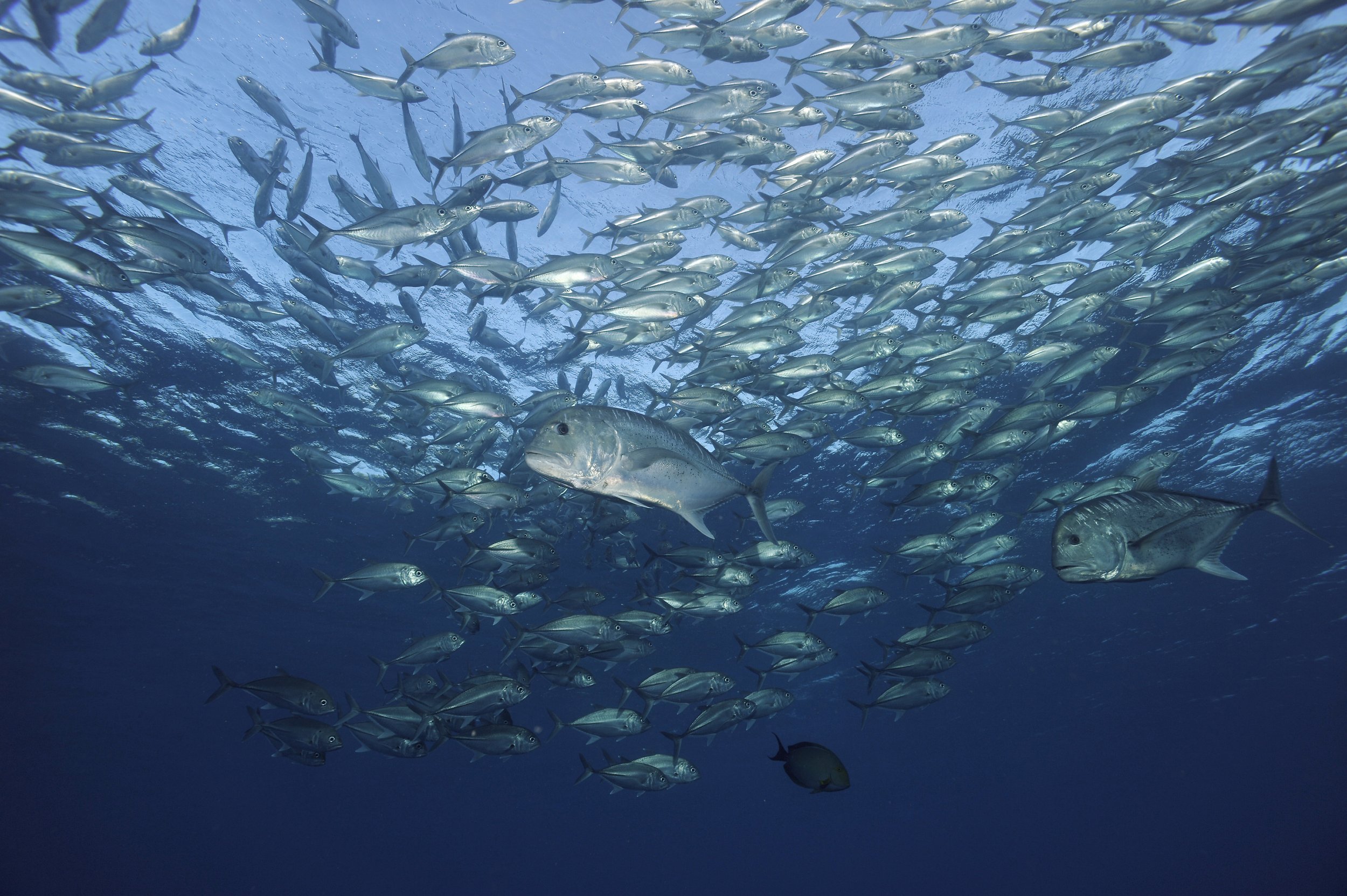
Our ocean
At around 360 million square kilometers, the ocean covers about 71% of the Earth's surface and contains 97% of our planet's water (1.35 billion cubic kilometers). 95% of the ocean is still unexplored, 91% of marine species have yet to be classified and 75% of the seabed has yet to be mapped at a high resolution. Scientists estimate that the ocean's biodiversity is between 1 and 2 million species, with millions more bacteria, other microbes and viruses.
Ocean habitats are extremely diverse, from tropical coral reefs to the icy poles, from mangroves in shallow water to the deep sea; each habitat is characterized by its specific light conditions, temperature, depth and salinity.
The ocean never rests, its movement is driven by the rotation of the earth, the tides, the wind, the temperature and its salinity. The temperature of the ocean ranges from 30 ºC at the surface to -1 ºC at the sea floor. At hydrothermal vents, water at temperatures of up to 400 °C enters the ocean; the high pressure at these depths prevents the water from boiling.
Its importance
The ocean produces between 50 and 80% of the Earth's oxygen, absorbs about 93% of the excess heat caused by climate change (raising its temperature and causing it to expand) and absorbs about 23% of carbon dioxide emissions, making it more acidic.
The OECD estimates that the annual market value of all marine and coastal resources and industries will reach USD 3 trillion by 2030 - equivalent to the seventh largest economy in the world. In a 2015 study, the WWF estimated the value of marine resources at 24 trillion US dollars.
More than 3 billion people live from the ocean, and more than 350 million jobs are linked to it. Almost 2.4 billion people, around 40% of the world's population, live within 100 km of the coast.
97% of our communications currently pass through over 400 submarine cables with a length of over 1.2 million kilometers (and rising). 90% of goods are transported by a fleet of almost 100,000 ships of 100 gross tons or more, registered in over 150 countries, employing over a million seafarers and carrying cargo all over the world. Marine tourism, from surfing to restaurants and hotels to cruise ships, accounts for more than 80% of tourism, with an expected annual growth of 114 billion euros.
We are harming the ocean
Climate change is harming the ocean the most because it:
heats the ocean massively,
causes sea levels to rise,
melts the polar ice,
kills almost all coral reefs,
raises the acidity levels of the ocean,
causes increasingly extreme storms,
and leads to more frequent and, for many organisms, deadly marine heat waves.
Humans are overfishing fish populations and are still using destructive fishing practices, these
are causing fish stocks to dwindle,
destroy large areas of seabed and their entire ecosystems.
Humans are using the ocean as a garbage dump and the pollution is growing every day. Every year, around 11 million tons of pollution enter the ocean from land or ships:
plastic and discarded or lost fishing nets, sewage, chemicals and oil,
The ocean is currently fighting a hopeless battle against humanity's waste.
The consequences are dire: plastic waste kills more than 1 million seabirds, 100,000 marine mammals and countless sea turtles and fish every year. As more and more pesticides, fertilizers and chemicals are released into the ocean, the number of dead zones where marine life suffocates is increasing dramatically.
We are also harming the sea with a cacophony of noise that can be deadly for marine mammals, such as the propulsion of ships, military and civilian echo systems, the sounds of massive pile driving for offshore energy, as well as military explosions in the course of warfare or the detonation of historical munitions.
But it is not yet too late:
Humans have understood their massively harmful impact on the ocean in its true dimension too late and ignored it for too long. Now it is high time not only to stop all damage immediately but also, if possible, to restore ecosystems that are on the brink of destruction.
Our ocean could largely recover if we change our behaviour now:
by reducing greenhouse gases through the massive and immediate use of renewable energies,
by radically stopping further pollution, for example through regenerative agriculture and complete purification of our wastewater, including the renunciation of eternal chemicals,
by stopping the extraction of raw materials from the ocean and preventing planned deep-sea mining.
We can support the ocean by:
establishing an extensive and networked system of protected areas,
initiating and promoting the restoration of coastal ecosystems such as mangroves, seagrass beds and kelp forests,
restoring marine regions that have already been destroyed, such as coral reefs and seagrass beds or oxygen-free dead zones.
Our ocean needs us:
Action is needed at all levels and by all. Every voice counts from people living near or far from the ocean, from young and old, indigenous communities, local communities, NGOs, businesses, regional and international organizations and states, from artisanal fishermen to large shipping companies, from plastic producers to waste pickers, from educators to heads of state. Only when everyone works together can we take real steps for the ocean.
Every action counts - by individuals, associations and groups to economists who need to come up with new business models on how to create value in the ocean without polluting or destroying it.
All measures that lead to a healthy ocean count. First and foremost, a political framework must be created for an uncompromising circular economy so that the ocean cannot be further damaged by human influences.
